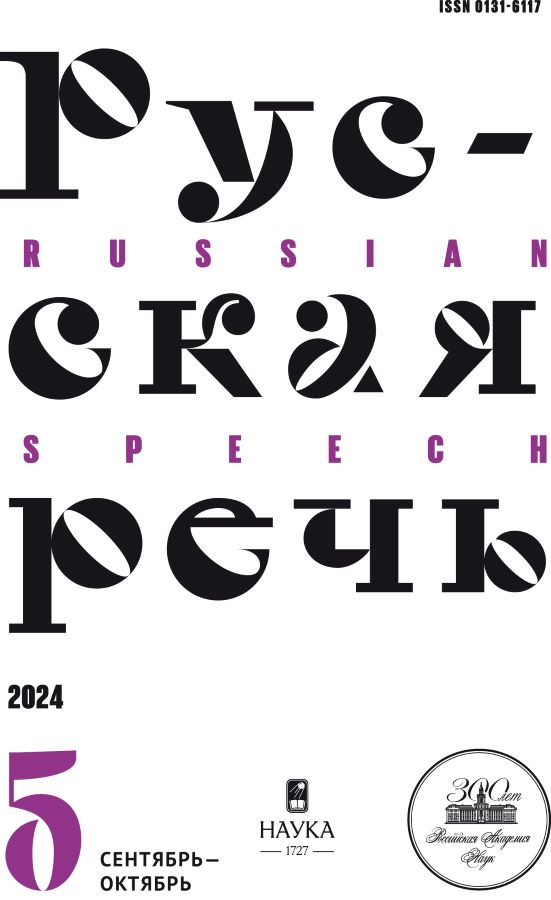A “naïve” perception of punctuation marks
- Authors: Shmelev A.D.1
-
Affiliations:
- Vinogradov Russian Language Institute of the Russian Academy of Sciences
- Issue: No 5 (2024)
- Pages: 20-33
- Section: Issues of Modern Russian Language
- URL: https://freezetech.ru/0131-6117/article/view/652401
- DOI: https://doi.org/10.31857/S0131611724050029
- ID: 652401
Abstract
This paper deals with the figurative meanings of Russian terms that refer to punctuation marks and are used in everyday language, namely, tochka (‘period, full stop’), skobki (‘parentheses’), kavychki (‘quotation marks’), zapiataia (‘comma’), znak voprosa (‘question mark’). It attempts to identify the ordinary native speakers’ “naive” conceptions of these punctuation marks and their functions. It shows that most expressions with the word tochka reflect the idea of the period as a sign of the complete end. The main function of parentheses (skobki) for ordinary speakers is to indicate that some statement (or its part) is optional. The main function of quotation marks (kavychki) as the speakers understand them is to refer to a non-standard use of a linguistic expression (in particular, an ironic use). The most typical phrases and set expressions with the word zapiataia are cherez zapiatuiu (literally, ‘through a comma, separated by a comma’) and do poslednei zapiatoi (‘to the last comma’). The former reflects the idea of listing, and the differences between the listed objects are presented as insignificant. The latter expression indicates thoroughness and attention to detail (perhaps even excessive). The phrase znak voprosa indicates uncertainty or doubt.
It is suggested that revealing speakers’ conceptions of the functions of punctuation marks may be useful for clarification and refinement of the punctuation rules.
Full Text
About the authors
Alexei D. Shmelev
Vinogradov Russian Language Institute of the Russian Academy of Sciences
Author for correspondence.
Email: shmelev.alexei@gmail.com
Russian Federation, Moscow
References
- Akhapkin D. N. [“Philological metaphor” in the poetics of Iosif Brodsky]. Russkaya filologiya, 9 [Russian Philology. 9. Collection of scientific works by young philologists]. Tartu, Tartu University Publ., 1998, pp. 228–238. (In Russ.)
- Baranov A. N, Dobrovol’skii D. O. (eds.). Akademicheskii slovar’ russkoi frazeologii [The academic dictionary of Russian phraseology], 2nd ed. Moscow, LEKSRUS Publ., 2015. 1168 p.
- Iomdin B. L. [Zapyataya ‘comma’]. Aktivnyi slovar’ russkogo yazyka [Active dictionary of Russian], vol. 3. Chief editor Yu. D. Apresyan. Eds. V. Yu. Apresyan, I. V. Galaktionova, B. L. Iomdin. Moscow; Saint Petersburg, Nestor-Istoriya Publ., 2017, pp. 636–637. (In Russ.)
- Khusnutdinov A. A. [To the history of the expression ‘i tochka’ (“that’s it”) in the Russian language]. Tula Scientific Bulletin. History. Linguistics, 2023, issue 1 (13), pp. 126–137. (In Russ.)
- Shmelev A. D. [Paradoxes of self-defeating]. Logicheskii analiz yazyka. Protivorechivost’ i anomal’nost’ teksta [Logical analysis of language. Contradictions and anomalies of discourse]. Chief ed. N. D. Arutyunova. Moscow, Nauka Publ., 1990, pp. 84–93. (In Russ.)
- Smirnova G. Yu. [Parentheses: verbal and/or graphic]. Russkii yazyk v shkole, 2012, no. 8, pp. 69–74. (In Russ.)
- Zhadeiko Zh. F. [Russian idioms with the terms for punctuation marks: ethnocultural and didactic aspects]. Slavyanskaya frazeologiya v sinkhronii i diakhronii [Slavic idioms in synchronic and diachronic aspects], issue 3. Gomel’, Skorina Gomel’ State University Publ., 2016, pp. 43–46. (In Russ.)










